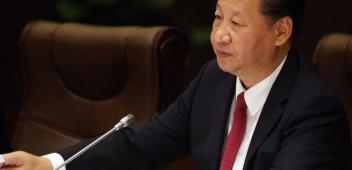Clive Palmer's outburst and Australian anxiety about Chinese investment
Clive Palmer's outburst and Australian anxiety about Chinese investment
Alex Oliver
The Guardian
20 August 2014
Please click here for the online text.

Executive Summary
Clive Palmer’s tirade against China and the Chinese government on ABC’s Q&A sounded like a lunatic rant. When host Tony Jonesquestioned him about allegations that he’d funnelled $12m in funds from Chinese mining partner Citic to fund his election campaign, Palmer’s incensed invective – calling the Chinese “mongrels” and “communists” who “shoot their own people” – hit a new low in the annals of Australian politicians’ behaviour. The Chinese embassy in Canberra deemed the slurs “absurd”, but generously emphasised the mutual interests and strong support for the relationship among the peoples of both countries.
Palmer has form in these sorts of outbursts; he’s been observed to work himself into apoplectic rages over incidents as trivial as the form of his title in a company prospectus. But with his frenzied attack on China, he may well have struck a chord with many Australians whose anxieties about China run along similar lines, if not expressed so rampantly.
Behaviour and language such as Palmer’s on Monday night are of course unseemly from an Australian elected representative, though Palmer is not the first Australian politician to use intemperate invective against China. His insults could even be called mild compared with those of then prime minister Kevin Rudd in his notorious diatribe – “those Chinese fuckers are trying to rat-fuck us” – during the Copenhagen climate talks in 2009.
Yet while their language and behaviour display woeful self-control and terrible manners, these political outbursts illustrate deeper problems which characterise the relationship between Australia and China, and they cannot be dismissed as mere temper tantrums.
Ironically, Palmer’s rant came on the same day that Australia’s foreign minister and trade and investment minister launched the government’s policy for economic diplomacy, a policy which to a significant extent will be directed at improving Australia’s trading and investment performance with our largest trading partner, China.
At the launch, trade and investment minister Andrew Robb reported that the prospect of concluding an Australia-China FTA by the end of the year “remains a realistic objective”, and spoke glowingly of the government-led 700-strong business delegation for Australia Week in China in April as “sending a very positive message to our biggest trading partner of the value we place as a government in the relationship”.
Hurling insults at a country and government with which Australia seeks to conclude a comprehensive free trade agreement by year’s end is unlikely to be helpful to that cause, so both ministers might well have cringed when they heard of Palmer’s outburst. But their reaction might not solely be based on the irritation provoked in China and the potential damage to Australia’s reputation. Palmer’s words might just have struck a more resonant chord precisely because they align quite closely with Australians’ feelings towards China. Whatever one thinks of Clive, he has a certain skill at channelling Australian popular opinion to his own advantage.
Chinese investment causes significant unease here. While Australians understand China’s economic importance to Australia, rating it well above the American and Japanese economies, the majority of Australians (56% in 2014 and similar numbers going back to 2009) think that the government allows too much investment from China. They might not direct abusive insults at the Chinese, but their concerns are real.
When asked their reasons in the 2012 Lowy Institute Poll, a majority of the population were worried that “China is seeking to buy Australian mining and agricultural companies”, and that “these need to be kept in Australian hands”. And on Palmer’s accusation that China wants “to take over this country”, Australians express some anxiety over this, a majority agreeing in our 2012 Poll that “China has so much money to invest it could end up buying and controlling a lot of Australian companies”.
China’s economic aggression is not the only concern for Australians. Its military aggression hasn’t gone unnoticed, with almost half the population saying that China could become a military threat to Australia in the next 20 years.
So China’s image in Australia is by no means benign. Palmer, with his keen populist instincts, knows this. And many Australians may well be quietly agreeing with his views, if not his language, on China.



